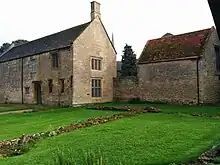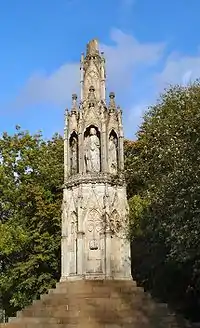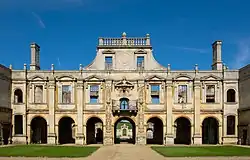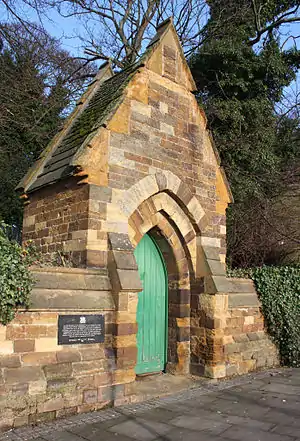Scheduled monuments in Northamptonshire
There are 221 scheduled monuments in the county of Northamptonshire, England.[1] These protected sites date from the Neolithic period and include barrows, artillery forts, ruined abbeys, castles, and Iron Age hill forts.[2] In the United Kingdom, the scheduling of monuments was first initiated to insure the preservation of "nationally important" archaeological sites or historic buildings. The protection given to scheduled monuments is given under the Ancient Monuments and Archaeological Areas Act 1979[3]
Notable scheduled monuments in Northamptonshire
| Image | Name | Location | Date | Notes |
|---|---|---|---|---|
.jpg.webp) |
Barnwell Castle | 52.45563°N 0.46062°W | 1132 AD | A motte and bailey castle built during the Second Barons' War (1264-67).[4] |
 |
Chichele College | 52.30765°N 0.59297°W | Early 15th century | A rare surviving example of a chantry college. Chantry colleges were popular in the 14th-15th centuries in Britain. They provided priests a communal life that was more informal than a monastery.[5][6] |
 |
Cosgrove aqueduct | 52.0687°N 0.8336°W | 1811 | A cast iron water bridge that carries the Grand Union Canal over the River Great Ouse.[7] |
 |
Fotheringay Castle | 52.5243°N 0.4362°W | 1100 AD | A High Middle Age Norman Motte-and-bailey castle. |
 |
Geddington Cross | 52.438°N 0.687°W | 1294 AD | The monument is the best preserved of the surviving Eleanor Crosses built by King Edward I in memory of his wife Eleanor. She died in Harby, Nottinghamshire in November 1290. The stone crosses were built in her memory to mark the nightly resting-places of her body as she was transported to Westminster Abbey.[8] |
 |
Roman town of Irchester | 52.2783°N 0.6555°W | Roman Britain | The town is the site of an earlier Roman and Iron Age settlement and the medieval hamlet of Chester on the Water. The Roman settlement included buildings, a cemetery, town walls and a Romano-Celtic temple.[9] |
 |
Kirby Hall | 52°31′27″N 0°38′14″W | 1570 | An Elizabethan country house[10] |
.jpg.webp) |
Hunsbury Hill | 52.21889°N 0.92023°W | Iron Age | An important example of a multivallate hillfort in Northamptonshire.[11] |
 |
Northampton Castle | 52.237°N 0.905°W | 1084 | Remains of a legendary 11th century castle. The favorite castle of King John, parliament was held there during his reign. Thomas Becket was tried at the castle in 1164 before escaping the castle by dressing as a monk.[12] |
See also
References
- "Scheduled monuments in Northamptonshire". Historic England. Retrieved 23 May 2023.
- "Scheduled Ancient Monuments in the Historic County of Dorset". Ancient Monuments UK. Retrieved 23 May 2023.
- "Scheduled Monuments". Historic England. Retrieved 23 May 2023.
- "Barnwell Castle". Historic England. Retrieved 4 June 2023.
- "'Chichele College': the remains of the medieval college of Higham Ferrers". Historic England. Retrieved 24 May 2023.
- "Chichele College". English Heritage. Retrieved 4 June 2023.
- "Wolverton iron trunk aqueduct". Historic England. Retrieved 24 May 2023.
- "Geddington Cross: Eleanor cross and conduit house". Historic England. Retrieved 24 May 2023.
- "Roman town of Irchester and preceding Iron Age settlement; including remains of the medieval hamlet of Chester on the Water". Historic England. Retrieved 30 May 2023.
- "Kirby Hall: an Elizabethan country house and gardens, including the remains of the medieval village of Kirby". Historic England. Retrieved 24 May 2023.
- "Multivallate hillfort at Hunsbury Hill". Historic England. Retrieved 24 May 2023.
- "Castle History". Friends of Northampton Castle. Retrieved 30 May 2023.
This article is issued from Wikipedia. The text is licensed under Creative Commons - Attribution - Sharealike. Additional terms may apply for the media files.